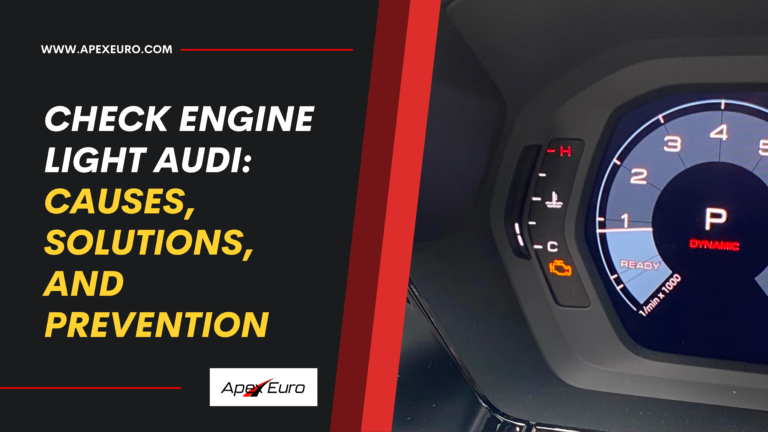If you own an Audi, you may have experienced the frustration of seeing the “check engine” light turn on. This warning light is an indication that there is a problem with your car, but the cause can vary. In this article, we will explore the most common causes of the “check engine” light in Audi vehicles, how to troubleshoot the issue, and how to prevent it from happening in the future.

The “check engine” light is an indicator on your Audi’s dashboard that there is a problem with your car’s engine. When the light turns on, it means that your car’s computer has detected an issue that needs to be addressed. It is important not to ignore the “check engine” light as it can lead to more severe problems if left unchecked.
– Faulty Oxygen Sensor
One of the most common causes of the “check engine” light in Audi vehicles is a faulty oxygen sensor. The oxygen sensor is responsible for measuring the amount of oxygen in the exhaust gasses, and if it is not functioning correctly, it can lead to decreased fuel efficiency and increased emissions.
– Loose or Damaged Gas Cap
A loose or damaged gas cap is another common cause of the “check engine” light. If the gas cap is not properly sealed, it can cause a vacuum leak, which can lead to the engine running poorly and decreased fuel efficiency.
– Malfunctioning Mass Airflow Sensor
The mass airflow sensor is responsible for measuring the amount of air entering the engine, and if it is malfunctioning, it can cause the engine to run poorly and decrease fuel efficiency.
– Issues with Spark Plugs and Ignition Coils
Spark plugs and ignition coils are responsible for igniting the fuel in the engine, and if they are not functioning correctly, it can cause the engine to run poorly and decrease fuel efficiency.
– Faulty Catalytic Converter
The catalytic converter is responsible for converting harmful exhaust gases into less harmful emissions. If it is not functioning correctly, it can cause the “check engine” light to turn on and can lead to decreased fuel efficiency and increased emissions.
If the “check engine” light turns on in your Audi, there are a few things you can do to troubleshoot the issue.
– Check Your Gas Cap
The first thing you should do is check your gas cap. Make sure it is tight and properly sealed. If the gas cap is loose or damaged, it can cause the “check engine” light to turn on.
– Inspect the Oxygen Sensor
If the gas cap is not the issue, you should inspect the oxygen sensor. If it is faulty, it will need to be replaced. This is not a DIY job and should be done by a professional.
– Check the Mass Airflow Sensor
If the oxygen sensor is not the problem, you should check the mass airflow sensor. This sensor can become dirty or clogged, which can cause it to malfunction. Cleaning or replacing the sensor can fix the issue.
– Inspect the Spark Plugs and Ignition Coils
If the mass airflow sensor is not the issue, you should inspect the spark plugs and ignition coils. If they are worn or damaged, they will need to be replaced. This is another job that should be done by a professional.
– Test the Catalytic Converter
If none of the above issues are the problem, you should have the catalytic converter tested. If it is not functioning correctly, it will need to be replaced.
Preventing the “check engine” light from turning on can save you time, money, and frustration. Here are a few tips to help prevent the issue:
– Regular Maintenance
Regular maintenance is key to preventing the “check engine” light from turning on. Make sure you follow your car’s recommended maintenance schedule and have it serviced by a professional.
– Drive Responsibly
Regular maintenance is key to preventing the “check engine” light from turning on. Make sure you follow your car’s recommended maintenance schedule and have it serviced by a professional.
– Use High-Quality Fuel
Using high-quality fuel can also help prevent the “check engine” light from turning on. Lower quality fuel can cause deposits to build up in the engine, which can lead to problems.
The “check engine” light can be a frustrating and confusing issue for Audi owners. However, by understanding the most common causes, troubleshooting the issue, and taking preventative measures, you can keep your Audi running smoothly and avoid costly repairs.